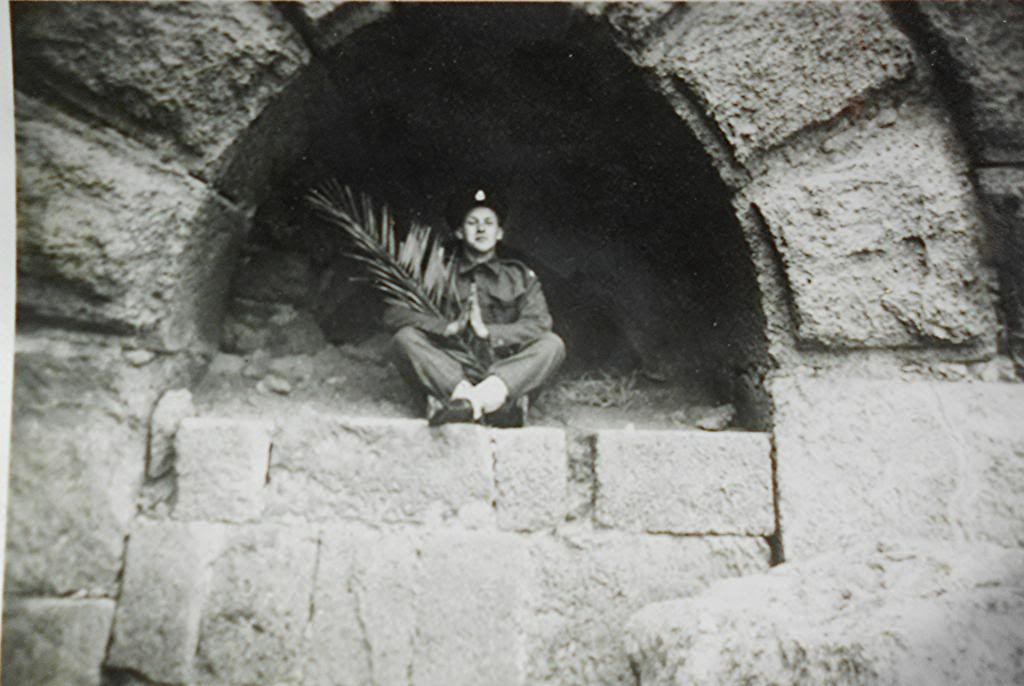We were up early this morning to be ready by
8a.m. when we were to move from the ship. In fact we were half an hour late leaving the
ship for the ferry which took us all to the Customs Wharf Crewe and again all got into the same compartment
with two Welsh men. We timed ourselves
through the Severn Tunnel, the first time I had been through it. (7 mins) Arriving at Newton 9p.m. I took a taxi home where I took
the folks partly by surprise as they did not expect me until later.
This is the final entry Ron made in his diary. He was discharged from the Service receiving his Certificate of Discharge in October 1949 having...

.jpg)
Afterword
Thank you for taking the time to share Ron's story with me.

For me it has been both a pleasure and a sadness to "hear" my father's voice again - albeit as written words.
I see how my handwriting has over the years come to resemble his.
I recognise his turn of phrase, his curiosity and his occasional pomposity. As a youth I was both engaged and embarrassed by his desire to get involved with the world around him. My father presented me with opportunities in which I sometimes blossomed and which, at other times, I was too "shy" to take.
A favourite expression of his in later life, if we were faced with a slightly challenging social situation was "Throw a bridge!" - open the conversation; make the effort to connect with the stranger; be interested in people and maybe they will respond positively to you; be open to new experiences and face what life places before you.
I recognise this as the spirit that had driven Ron to serve in Palestine - the Holy Land, a land of intrigue and exoticism, a mixture of the Biblical and the political, fascinating to a young, open and impressionable mind.
Throughout his life, Dad's enthusiasm for his experiences in Palestine never left him. For us children the stories he told of those times were fascinating - some humorous, some curious, some horrific - but the continuing political situation flummoxed him - he remained uncertain how the situation could ever be resolved.

I had no great overarching purpose when I decided to present Dad's diaries to a wider audience. They are simply the impressions of a young, uncomplicated man responding to a complicated situation. But they are a human account by a person I love and for me that is enough. As a contribution to the historical picture of the period they represent a tiny, largely insignificant part. Dad was just a 19 year-old doing a job - he wasn't there to question the decisions made in distant government offices.
But if Dad's recorded experiences show anything at all it is that the situation was then and continues to be hugely complex. Maybe part of the difficulty of resolving the political situation is that opposing factions may see things in rather more black and white terms. If more emphasis can be placed on the human within the political; and if an attitude of compassion be adopted, then perhaps more progress could be made.
I am supremely conscious of my ignorance of the complexities of the Palestine/Israel conflict - although I do have a slightly clearer understanding now than I had at the beginning of this undertaking. In my reading and research I have come to appreciate the bungling and ineffectual part the British government played. The British seemed to regard Palestine as something of a poison chalice. I recognise the passion felt by the Jewish people in seeking a homeland especially after the atrocities of the Second World War. I also understand the outrage of the Palestinians whose homeland has been "occupied". I have been shocked and dismayed by the continuing behaviour of the Israeli government in their treatment of the original inhabitants of the land. The illegal settling of large areas of Palestinian land, the literal eradication of villages, of peoples homes, the denial of human rights - these are tactics that cannot be acceptable in a modern democracy regardless of the political situation or historical context.
If you have any questions or comments I would love to hear from you.

.jpg)
.jpg)
.jpg)
No comments:
Post a Comment